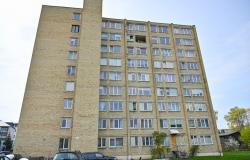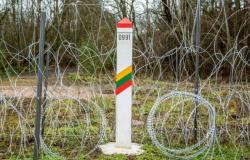The main challenges that a student faces in Lithuania are the language barrier and lack of time.
Luisina is a freshman in New Media Studies at KTU, but this is not her first attempt to live in Lithuania. Before the quarantine began in 2019, the girl studied Lithuanian in Vilnius. Then, she says, everything was as expected – and even more.
The KTU student from Argentina chose it because of its prestige and excellent reviews. Although the first weeks in the new country were full of challenges, Luisina claims that “at KTU there are always people ready to lend a helping hand.”
Personal archive photo/Luisina Allevato
The KTU student from Argentina has Lithuanian roots – her great-grandparents were Lithuanian. While living in Argentina, she participated in the activities organized by the Beris Lithuanian community in Buenos Aires, and during the “Dance Festival in Argentina 2022” Luisina worked in the social media and press team. This experience prompted her to return to Lithuania.
The girl says that, as an immigrant, it is not easy for her to settle in Lithuania – both the bureaucratic difficulties and the workload are tiring: Luisina studies in the mornings, and after lectures she works full-time. Although it is extremely difficult for her to find time for new classes, in order to avoid inconveniences caused by the language barrier in the future, the student manages to find time to improve her Lithuanian language skills.
He respects the teachers: “It is very difficult to teach young people something”
KTU L. Allevato studies in the new media language studies program.
“This study program is amazing because everything we learn is related to real life, which makes it even more interesting,” says the first-year student at KTU’s Faculty of Social Sciences, Humanities and Arts.
Personal archive photo/Luisina Allevato
Luisina has practical work experience – that’s when she got to see behind the scenes in communication companies. This is how the girl became interested in the concept of the New Media Language study program, and the interesting content of the studies encouraged her to apply for studies.
“New media studies explore not only what we say or don’t say, but also how we say it, what we have to say and how it is perceived. We are all connected in this world – we live and die by our words and how we choose to share them,” explains the student.
One of the best things about new media language studies for Luisina is the teachers who love their work: “Transforming people is one of the most difficult jobs, and teaching young people is even more difficult – quite a few of them have problems concentrating and are convinced that they know everything.”
According to her, for this reason, the lectures of some teachers are particularly popular and go very smoothly, which motivates to continue learning. The student admits that it is the other way around – lectures taught by less enthusiastic teachers have the opposite effect.
“I really like that everything we learn helps us become better versions of ourselves, regardless of what path we choose to take in the future.” During our studies, we acquire skills that every adult needs at work or in everyday life, such as public speaking, academic writing skills, as well as specific media knowledge,” says Luisina.

Personal archive photo/Luisina Allevato
The journey to Lithuania is not only across the ocean, but also in time
Arriving from a country that is more than 12 thousand away from Lithuania. kilometers, the student from Argentina is happy about many things – “from being safe here to being able to save money”.
However, she admits that there are moments when living here she feels like she has traveled back in time, and the narrow-mindedness and coldness of the local population is a bit difficult for her to understand.
“I understand that the culture shock I’m experiencing may be related to the country’s historical circumstances, but sometimes when I leave home and meet the appraising eyes of the locals, I feel like I’m from 2023. I would have traveled to Argentina in the 20th century. Lithuania of the 1960s,” says the KTU student who moved to her great-grandparents’ hometown almost a year ago.
However, she especially likes the landscape of Lithuania: “Even on a gloomy winter day, the snow-covered forests, lakes and rivers look magical.”
This winter, Luisina saw snow for the first time – she says she liked it. Since she has been living here since last spring, she claims that summer in Lithuania is more pleasant than in Buenos Aires, because the climate here is a bit drier.

Personal archive photo/Luisina Allevato
Although she initially had the opportunity to try local Lithuanian dishes, Luisina was recently diagnosed with celiac disease.
“Now I can only eat zeppelins,” the girl smiles and admits that she likes to buy them frozen at the local supermarket.
When she has time, Luisina chooses a restaurant for lunch, but more often than not, she tries to juggle multiple tasks and relies on her time management skills.
“My motto is to rest in the summer,” jokes Luisina Allevato, a first-year student of Lithuanian origin at KTU from Argentina.
Tags: easy KTU student Lithuanian origin Argentina adapt country greatgrandparents Life
-








